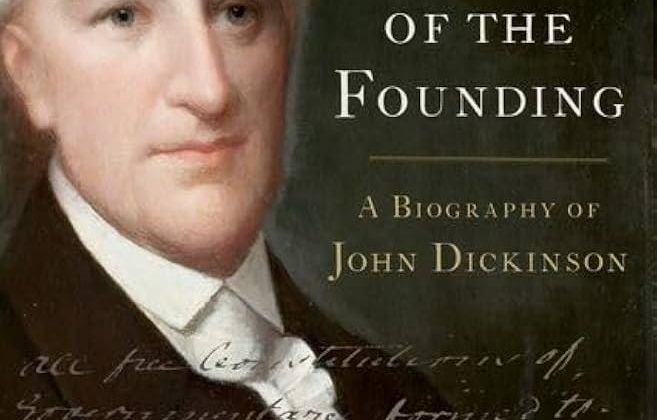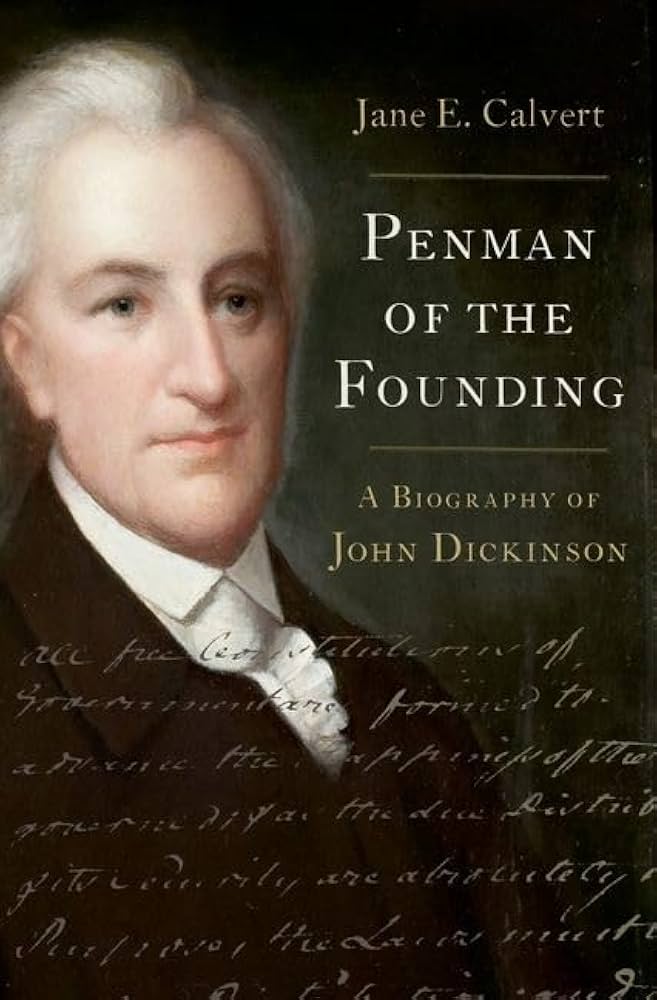

Jane E. Calvert is Director and Chief Editor of The John Dickinson Writings Project. This interview is based on her new book, Penman of the Founding: A Biography of John Dickinson (Oxford University Press, 2024).
JF: What led you to write Penman of the Founding?
JC: In short, the astounding dearth of information on John Dickinson compelled me to write it. Before now, only three biographies had been written on him (in 1891, 1983, and 2013), none of which is complete or completely accurate. Since about 2010, I had been planning to write one as the final component of a tripart research agenda that began with my first book, Quaker Constitutionalism and the Political Thought of John Dickinson (2009) and has been ongoing with my John Dickinson Writings Project (JDP). The impetus to produce the biography ahead of schedule was when Gov. John Carney of Delaware asked me to prioritize it, and the Delaware legislature granted me $300,000 to release me from my two other jobs, teaching at the University of Kentucky and managing the JDP.
JF: In 2 sentences, what is the argument of Penman of the Founding?
JC: John Dickinson was ubiquitous at the Founding, and the origins of our country cannot be understood without him. No figure did more to assure the success of the American Revolution, both before and after the Declaration of Independence.
JF: Why do we need to read Penman of the Founding?
JC: In critical ways, John Dickinson’s life, thought, and contributions to the Founding contrasted starkly with the Founders with whom we are most familiar. Of the main leaders, he was the only one who understood the principles in the Declaration of Independence as we do today, that all people are created equal and endowed with inalienable rights. And he took steps as a lawyer, statesman, and private citizen to secure those basic rights and the wellbeing of all people.
JF: Why and when did you become an American historian?
JC: I began graduate school at the University of Chicago in 1995 seeking answers to questions I had about American political culture. I had attended a far-left college with speech codes and intolerance for dissent, and then my first job after graduation was with an education reform project at a neo-conservative think tank. Folks there believed that the main purpose of education was to prepare young people for “participation in a global economy” rather than human flourishing. I found both political extremes troubling, and I wanted to know why Americans relate to one another and their government as they do. What do they see as their rights, their responsibilities to one another, and the role of government? My goal was to go back to the origins of our country to understand the intellectual history of the colonial era and then teach what I learned to college students. Unfortunately, over the last thirty years, the ill-will of Americans towards one another and the government has only increased.
JF: What is your next project?
JC: In 2022, I organized the John Dickinson Symposium, which was hosted in Philadelphia by the American Philosophical Society, the Library Company of Philadelphia, the Historical Society of Pennsylvania, the McNeil Center for Early American History, and the Omohundro Institute for Early American History and Culture. The scholars who participated produced excellent papers, which I would like to publish in an edited volume. Other than that, there are still 11 volumes of Dickinson writings to publish!
JF: Thanks, Jane!